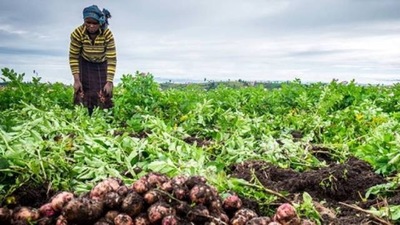
Angola has an abundance of arable land and a diversity of climatic conditions that are suitable for producing a variety of agricultural products.
According to World Bank analysts, the country was once a major producer and exporter of agricultural products, including coffee, cotton, and bananas.
However, exports of these had virtually ceased by the 1990s as a result of the civil war (1975–2002), which led to the collapse of commercial agricultural production, and Angola’s agricultural potential has remained untapped since then.
Only 10% of the 35 million hectares of arable land in the country are currently being cultivated.
In recent years, however, agriculture’s share of Angola’s economy has grown rapidly, averaging 4.9% a year, thus leading to agriculture’s share of GDP increasing from 5.8% to 10% of Angola’s GDP during the 2011–2017 period. Similarly, irrigation, as a pathway to climate adaptation, currently plays a modest role in Angola, but offers great potential for supporting resilience in the agricultural sector against water-related risks.
Angola’s vulnerability to climate change and climate shocks has been increasing significantly, and the population is already experiencing its impact, making efforts to revitalize and adapt the agricultural sector all the more important.
Angola is currently facing its most severe drought in the last 40 years, directly impacting the food security of 1.58 million people in the country’s southern provinces.
According to the 2022 World Bank’s report Water Security and Drought Resilience in South Angola, the economic impacts of the drought across all sectors are estimated at over US$749 million, with the agriculture, livestock, and fisheries sectors being by far the most damaged.
As with other parts of the world, Angola has also seen a steep increase in food prices – especially wheat – due to the Russia–Ukraine war, which is having devastating impacts on the poorest.
Furthermore, the World Bank’s Angola Country Climate and Development Report (CCDR) will support the government to develop a climate-informed investment and reform program to achieve its development goals in the context of climate change, through climate resilience and energy decarbonisation pathways.
According to the CCDR’s Agriculture Deep Dive Note: “climate change projections show that yields of major crops will be negatively impacted by climate change by as much as 4% to30% by the 2050s, largely driven by shorter and more concentrated rainy seasons, higher temperatures, increased droughts, and water scarcity. The number of livestock affected by extreme climate conditions will reach up to 70% of total livestock populations, up from 40%.”
Transforming the Agricultural Sector through Seizing Opportunities
In its efforts to diversify the economy and address climate change, the Government of Angola has been revitalizing its rural economy and its vast agricultural resources.
The US$230 million Angola Commercial Agriculture Project (PDAC), co-financed by the World Bank and the French Agency for Development, aims to increase agricultural productivity and market access to more commercial farms.
PDAC’s innovative interventions to promote and support agribusiness development have led to the approval of 25 business plans with a total of US$7.7 million in investments, of which US$2.,9 million were matching grants, and to the unprecedented issuance of 16 partial credit guarantees for the agricultural sector, amounting to more than $1 million in local investment.
On June 16, 2022, the World Bank also approved the US$300 million Smalllholder Agricultural Transformation Project (PROTAF), which will become effective on December 15, 2022, and will contribute to Angola’s efforts to transition from vulnerable subsistence farming to climate-resilient farming.
“The PROTAF project will help farmers increase production, so they have surpluses to sell at local markets, expand access to agricultural extension through the institutionalization of the Farmer Field Schools, and support smallholder farmers to adopt climate- as well as nutrition-smart agriculture,” the World Bank report reads.
“Together, these efforts will increase resilience, food security, and nutrition and reduce both dependence on food imports and the agriculture sector’s environmental footprint. Additional climate co-benefits will be achieved by expanding access to improved production technologies, inputs, and extension services through public–private dialogue.
In addition, the US$300 million Bank-financed Climate Resilience and Water Security Project (RECLIMA), approved in March 2022 will support the government in its efforts to improve water supplies and strengthen water resource management for greater climate resilience in Angola.
To become an agricultural powerhouse on the African continent Angola’s agricultural sector will need to be transformed to meet the needs of its people (especially vulnerable farmers and livestock producers), economy, and environment.
To achieve this, the Government of Angola is ramping up its own efforts and joining forces with development partners, like the World Bank Group, in the preparation and implementation of transformative projects.











